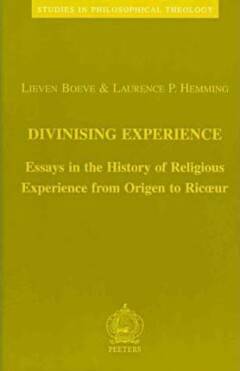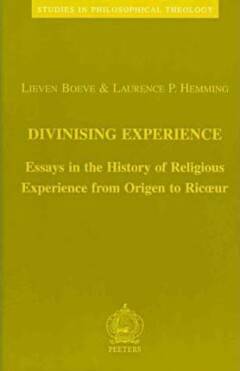
- Afhalen na 1 uur in een winkel met voorraad
- Gratis thuislevering in België vanaf € 30
- Ruim aanbod met 7 miljoen producten
- Afhalen na 1 uur in een winkel met voorraad
- Gratis thuislevering in België vanaf € 30
- Ruim aanbod met 7 miljoen producten
Zoeken
Divinising Experience
Essays in the History of Religious Experience from Origen to Ricoeur
Boeve L.//Hemming L.P.
€ 35,00
+ 70 punten
Omschrijving
There is hardly a category more prominent in modern and postmodern reflection on religion than that of religious experience. In Divinising Experience, scholars gathered in the Research Group 'Theology in a Postmodern Context' (K.U.Leuven), have sought to investigate from quite different perspectives the theological approaches of twelve key authors in the history of religious experience. Organised chronologically, they present studies on Origen, St Augustine, St Thomas Aquinas, St Ignatius of Loyola, Friedrich Schleiermacher, William James, Wolfhard Pannenberg, Paul Tillich, John Henry Newman, Edward Schillebeeckx, Hans Urs von Balthasar and Paul Ricoeur. Not surprisingly, each of the investigations in itself suggests a different approach to and an analysis of 'experience' as a category. This volume therefore presents almost a 'double movement' on the one hand as enquiries into specific thinkers, and on the other to discover who we are as readers, when we take up the category of religious experience as a reading key. In their own way, the twelve essays of Divinising Experience provide a kind of introductory reader in the question of religious experience.
Specificaties
Betrokkenen
- Auteur(s):
- Uitgeverij:
Inhoud
- Aantal bladzijden:
- 278
- Taal:
- Engels
- Reeks:
Eigenschappen
- Productcode (EAN):
- 9789042913837
- Verschijningsdatum:
- 19/08/2004
- Uitvoering:
- Paperback
- Formaat:
- Trade paperback (VS)
- Afmetingen:
- 160 mm x 239 mm
- Gewicht:
- 453 g

Alleen bij Standaard Boekhandel
+ 70 punten op je klantenkaart van Standaard Boekhandel
Beoordelingen
We publiceren alleen reviews die voldoen aan de voorwaarden voor reviews. Bekijk onze voorwaarden voor reviews.











